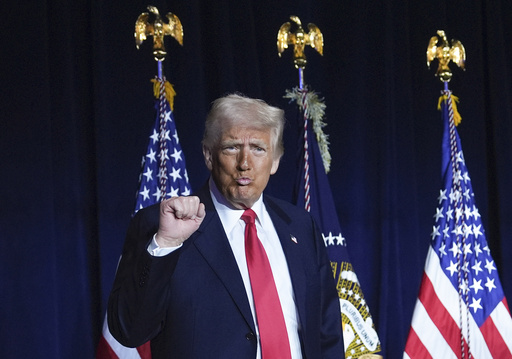
While addressing gatherings in Washington near the National Prayer Breakfast, Trump instructed the task force to pursue the immediate cessation of any forms of anti-Christian discrimination within federal agencies, including the Department of Justice, the Internal Revenue Service, and the FBI, which he referred to as “absolutely terrible.” He committed to thoroughly prosecuting acts of violence and vandalism directed at Christians and to diligently defending the rights of Christians and religious individuals across the country.
Trump’s remarks followed his participation in the National Prayer Breakfast, a long-standing bipartisan event that encourages fellowship among lawmakers. He shared that his understanding of religion has “changed” significantly following two assassination attempts last year, urging the American public to “bring God back” into their lives.
However, shortly after advocating for “unity” during his address with lawmakers, Trump shifted to a more divisive narrative at a second event, where he not only unveiled the task force but also announced the creation of a commission on religious liberty. He criticized the Biden administration, claiming it has engaged in “persecution” against believers while holding accountable anti-abortion proponents.
Trump also took pride in his administration’s recent efforts to dismantle programs associated with diversity, equity, and inclusion, as well as to restrict transgender athletes from competing in women’s sports. “I don’t know if you’ve been watching, but we got rid of woke over the last two weeks,” he proclaimed emphatically.
The formation of the new task force drew backlash from Americans United for Separation of Church and State. Its CEO, Rachel Laser, condemned the initiative, arguing that instead of safeguarding religious beliefs, it would exploit religious freedom to excuse bigotry and discrimination while undermining civil rights laws.
Emphasizing the importance of religion, Trump stated, “People can’t be happy without religion, without that belief.” He continued to advocate for bringing God back into daily lives during his speech on Capitol Hill.
In contrast, Rev. Paul Brandeis Raushenbush, a Baptist minister and leader of the progressive Interfaith Alliance, accused Trump of inconsistency for launching the task force. He stated that the Trump administration’s measures have hindered religious freedom, from immigration raids in places of worship to targeting religious charities and suppressing religious diversity, marking an unprecedented level of government overreach.
Kelly Shackelford, head of the conservative legal organization First Liberty Institute, offered a different perspective, commending Trump for instituting the task force and the commission on religious liberty. He voiced the necessity for all Americans to practice their faith without being interfered with by governmental measures in schools, the military, workplaces, or public forums.
Trump also revealed the establishment of a White House office of faith, to be led by Paula White-Cain, a long-standing pastor within the independent charismatic movement. An early backer of Trump’s presidential campaign in 2016, White-Cain previously directed Trump’s Faith and Opportunity Initiative, guiding faith-based groups on partnerships with the federal government. During the prayer breakfast, she hailed Trump as an unparalleled advocate for religion during his presidency.
The 2023 National Prayer Breakfast was notably marked by a split into two separate events: one on Capitol Hill primarily attended by lawmakers, and a larger private gathering for thousands at a hotel ballroom. This division arose as legislators sought to dissociate from the private religious organization that had traditionally overseen the larger event.
Reflecting on a past experience where a bullet narrowly missed him at a rally in Butler, Pennsylvania, Trump shared his renewed faith, telling event attendees, “It changed something in me.” He asserted, “I feel even stronger; while I believed in God, I now feel a deeper conviction. Something happened.” At the prayer breakfast that followed, he credited God for his survival in that situation, even joking about how it did not impact his hairstyle.
As a self-identified nondenominational Christian, Trump labeled religious liberty as a fundamental principle of American life, pledging to defend it unwaveringly. However, his time in office has not been without strife with religious leaders, such as when he publicly disagreed with Rev. Mariann Budde’s sermon on mercy for the LGBTQ+ community and undocumented migrants shortly after his inauguration.
Vice President JD Vance, who is Catholic, has similarly faced tensions with church leaders around immigration matters, while many religious figures express concern over the potential for federal officials to conduct immigration operations in houses of worship due to changes in policy that remove protections for churches.
In the past, Trump made headlines during his final prayer breakfast of his first term, which occurred just after his Senate acquittal in his first impeachment trial. At that event, he took subtle jabs at then-House Speaker Nancy Pelosi and Sen. Mitt Romney, both of whom had alluded to using their faith in making decisions against Trump.
The National Prayer Breakfast has a historical origin dating back to President Dwight D. Eisenhower’s attendance in February 1953, with each subsequent president since having participated in the gathering. This year, Democratic Sen. Maggie Hassan from New Hampshire and Republican Sen. Roger Marshall from Kansas served as honorary co-chairs for the breakfast. In 2023 and 2024, President Joe Biden also spoke at the Capitol Hill event, with his comments broadcasted to the alternate gathering.

